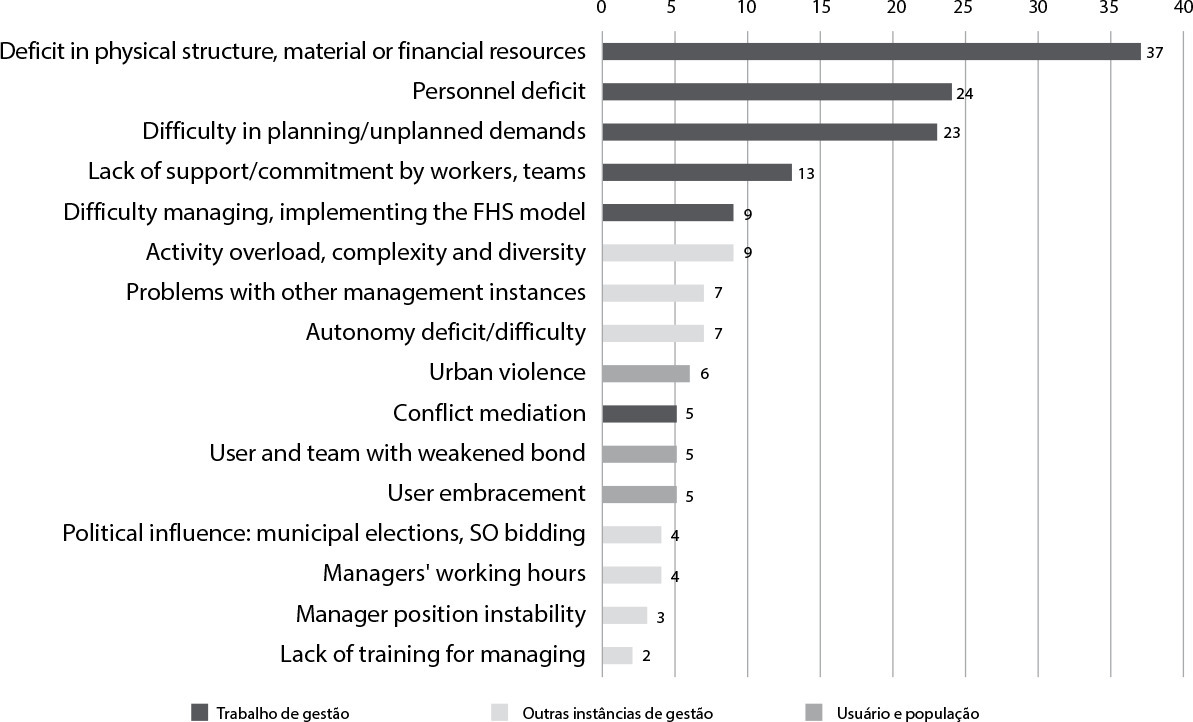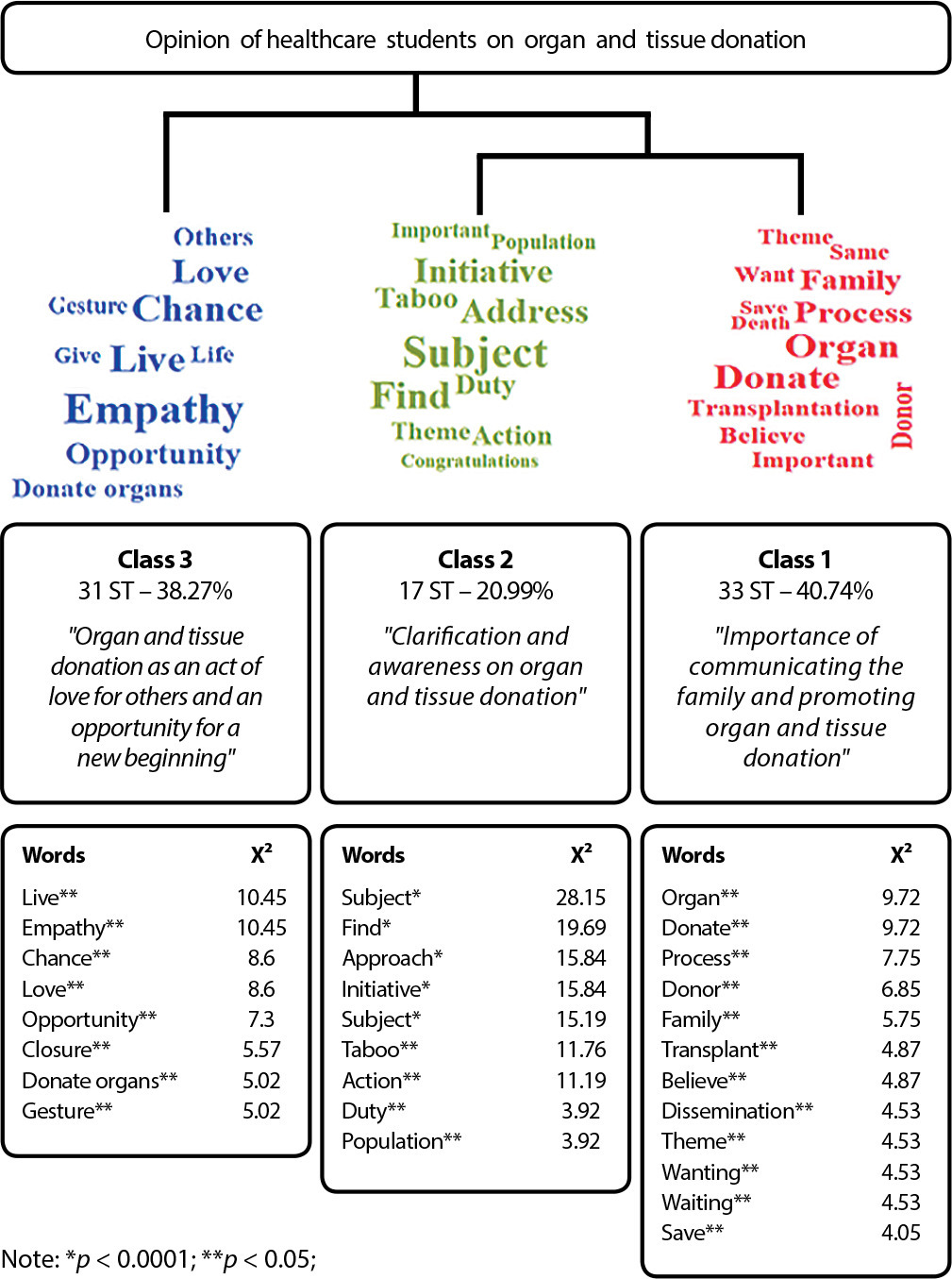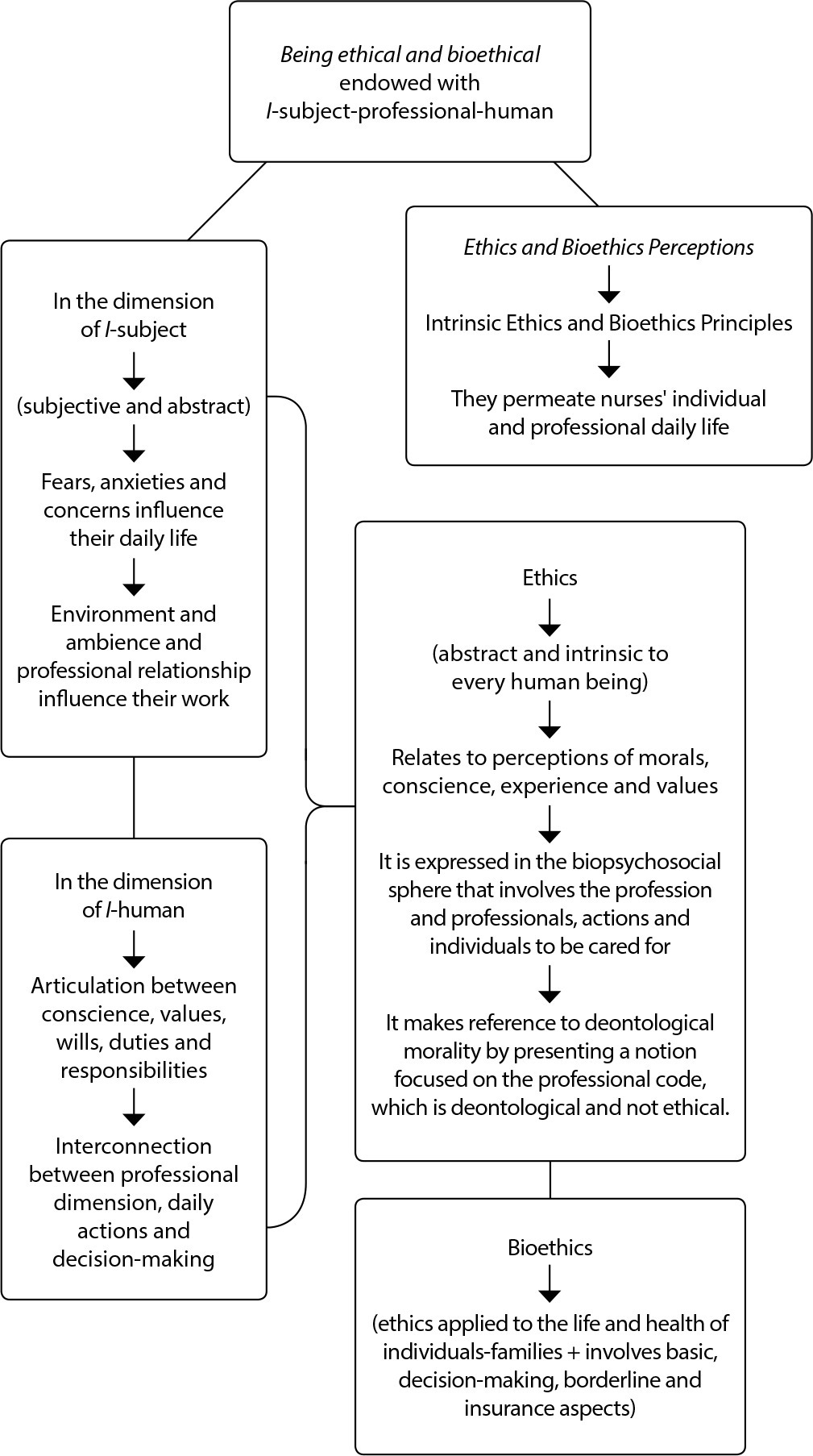-
ORIGINAL ARTICLE10-21-2022
“EMPODEREENF”: construction of an application for nurses’ continuing education on psychological violence against women
Revista Brasileira de Enfermagem. 2022;75(5):e20200391
Abstract
ORIGINAL ARTICLE“EMPODEREENF”: construction of an application for nurses’ continuing education on psychological violence against women
Revista Brasileira de Enfermagem. 2022;75(5):e20200391
DOI 10.1590/0034-7167-2020-0391
Views0See moreABSTRACT
Objective:
to construct a prototype of a mobile application on psychological violence against women to facilitate nurses’ continuing education.
Method:
an applied methodological research of technological development, based on the Contextualized Instructional Design method.
Results:
the prototype content was based on the learning objectives developed through a narrative review, which guided an integrative review to compile the information. The prototype is called “EmpodereEnf”, and is composed of an initial screen, bringing nurses as a target audience, and, soon after, offering nine general moblets for access to information such as: concepts, causes, manifestations and consequences of psychological violence; means for identification and approach in nursing consultation and health education; compulsory notification and referral; examples of cases of psychological violence and references.
Final considerations:
the prototype is a possibility for future coping interventions and a work tool for nurses in the face of psychological violence against women.

-
ORIGINAL ARTICLE10-21-2022
Management in the Family Health Strategy: workloads and structured institutional violence
Revista Brasileira de Enfermagem. 2022;75(3):e20220071
Abstract
ORIGINAL ARTICLEManagement in the Family Health Strategy: workloads and structured institutional violence
Revista Brasileira de Enfermagem. 2022;75(3):e20220071
DOI 10.1590/0034-7167-2022-0071
Views0See moreABSTRACT
Objectives:
to understand the relationship between workloads and institutional violence in Family Health Strategy managers’ practice.
Methods:
qualitative research using theoretical triangulation and data from semi-structured interviews. Participants were 35 managers of Basic Health Units in the five Regions of Brazil, who worked in the Family Health Strategy. We used thematic analysis and ATLAS.ti for data analysis.
Results:
workloads were analyzed, showing relationships with institutional violence. Thematic categories emerged: “related to the management work itself”; “related to other instances of health system management”; “related to users and community”. There was an interrelationship between increased managers’ workloads and institutional violence.
Final Considerations:
the Family Health Strategy is relevant for universal access to health and requires favorable institutional conditions for its effectiveness. Adverse scenarios lead to increased workloads, approaching institutional violence.

-
ORIGINAL ARTICLE10-21-2022
Self-care deficit among older men in the COVID-19 pandemic: implications for nursing
Revista Brasileira de Enfermagem. 2022;75:e20210933
Abstract
ORIGINAL ARTICLESelf-care deficit among older men in the COVID-19 pandemic: implications for nursing
Revista Brasileira de Enfermagem. 2022;75:e20210933
DOI 10.1590/0034-7167-2021-0933
Views0See moreABSTRACT
Objectives:
to analyze self-care deficit among older men in the COVID-19 pandemic in Brazil and to discuss the implications for nursing practice.
Methods:
web survey, multicentric, qualitative. A total of 120 older men participated, applying a form from April to June 2020 and April to August 2021. Reflective Thematic Analysis, interpreted by Orem’s Self-Care Deficit Theory, was used.
Results:
temporally, the self-care of older men was manifested in the self-care requirements – affective bonds, self-care for development – meditation and self-care with health deviations – remote consultations. Fully, partially compensatory, educational/support systems mobilized self-care.
Final Considerations:
as care managers, nurses can strengthen the support network for older men by activating professionals from the multidisciplinary team, family members, caregivers and the community to promote self-care and correct health deviations in times of crisis.

-
ORIGINAL ARTICLE10-21-2022
Circle dance: integrative and complementary practice in the daily health promotion for older adults
Revista Brasileira de Enfermagem. 2022;75:e20210003
Abstract
ORIGINAL ARTICLECircle dance: integrative and complementary practice in the daily health promotion for older adults
Revista Brasileira de Enfermagem. 2022;75:e20210003
DOI 10.1590/0034-7167-2021-0003
Views0See moreABSTRACT
Objectives:
to understand circle dance as an integrative and complementary practice for health promotion in older adults’ daily lives.
Methods:
an interpretive, qualitative study, based on Michel Maffesoli’s Comprehensive Sociology of Everyday Life. There were 20 participants, 17 older adults and three focalizers in circles held in Basic Health Units in a municipality in southern Brazil. Data were collected through interviews and observation, between September 2016 and March 2017, and analyzed through preliminary analysis, ordering, key links, coding and categorization.
Results:
three categories emerged that express the daily life of circle dance with older adults: circles that spin; challenges for new circles to spin; entering, being and staying in the circle.
Final Considerations:
circle dance provided older adults with a feeling of belonging to a group, combined with pleasure and well-being, contributing to promotion of older adults’ health.
-
ORIGINAL ARTICLE10-18-2022
Knowledge about antineoplastic drugs: implications for the health of nursing workers in a general hospital
Revista Brasileira de Enfermagem. 2022;75(3):e20210025
Abstract
ORIGINAL ARTICLEKnowledge about antineoplastic drugs: implications for the health of nursing workers in a general hospital
Revista Brasileira de Enfermagem. 2022;75(3):e20210025
DOI 10.1590/0034-7167-2021-0025
Views0See moreABSTRACT
Objectives:
to understand, from a worker’s health perspective, the knowledge of nursing professionals about the use of antineoplastic drugs in a general hospital.
Methods:
a descriptive and exploratory study with a qualitative approach. It was conducted at a university hospital, between April and August 2018, with 35 nursing professionals who responded to a semi-structured interview. Thematic analysis was used for data treatment.
Results:
from the data, three thematic categories emerged, related to the nursing professionals’ knowledge about antineoplastic drugs and their effects on workers’ health; situations in which exposure to these drugs occurs; and protection mechanisms for the patient, the environment, and the worker.
Final Considerations:
the nursing professionals had little knowledge about antineoplastic drugs. The practices related to handling and the necessary protective measures to deal with these drugs were empirically determined and relatively subsidized the knowledge acquired by the professionals.
-
ORIGINAL ARTICLE10-18-2022
Opinions of healthcare students on organ and tissue donation for transplantation
Revista Brasileira de Enfermagem. 2022;75(3):e20210001
Abstract
ORIGINAL ARTICLEOpinions of healthcare students on organ and tissue donation for transplantation
Revista Brasileira de Enfermagem. 2022;75(3):e20210001
DOI 10.1590/0034-7167-2021-0001
Views0See moreABSTRACT
Objectives:
to analyze the opinions of healthcare students on organ and tissue donation for transplantation.
Methods:
qualitative document analysis study, using the records of a database and analyzing data from two perspectives: 1) Lexical analysis, with the IRAMUTEQ software, and 2) Thematic content analysis.
Results:
from the analysis, 3 main categories were generated: 1) Organ and tissue donation as an act of love for others and an opportunity of a new beginning; 2) Clarification and awareness on organ and tissue donation; and 3) Importance of communicating the family and promoting organ and tissue donation.
Final Considerations:
despite being in favor of donation, students also recognize the presence of social taboos; the discussion in the family nucleus, promoting the theme and raising awareness in society are considered important. Additionally, the education of students is one of the possibilities of intervention for the issue.

-
ORIGINAL ARTICLE10-18-2022
Being ethical and bioethical in daily life of primary health care: nurses’ perceptions
Revista Brasileira de Enfermagem. 2022;75(3):e20210093
Abstract
ORIGINAL ARTICLEBeing ethical and bioethical in daily life of primary health care: nurses’ perceptions
Revista Brasileira de Enfermagem. 2022;75(3):e20210093
DOI 10.1590/0034-7167-2021-0093
Views0See moreABSTRACT
Objectives:
to understand the perceptions of ethics and bioethics and how to be ethical and bioethical in daily life of Primary Health Care, from the perspective of nurses.
Methods:
this is a Holistic-qualitative Multiple Case Study, based on Comprehensive Everyday Sociology, with 54 participants.
Results:
two subcategories and the category Being ethical and bioethical in daily life of PHC: nurses’ perceptions emerged. The ethical and bioethical being permeates a subjective and abstract self, whose fears, anxieties and concerns are intertwined with the human and professional dimensions in daily work and in personal-professional relationship. Ethics and bioethics perceptions emerge from subjectivity, established relationships, lived experiences and daily actions of nurses essential to the profession, professionals and individuals to be cared for.
Final Considerations:
ethical and bioethical perceptions and attitudes are essential to care, management and organizational actions, health care, and the safety of users and professionals.

-
ORIGINAL ARTICLE10-18-2022
Breast cancer screening program for risk groups: facts and perspectives
Revista Brasileira de Enfermagem. 2022;75(3):e20210050
Abstract
ORIGINAL ARTICLEBreast cancer screening program for risk groups: facts and perspectives
Revista Brasileira de Enfermagem. 2022;75(3):e20210050
DOI 10.1590/0034-7167-2021-0050
Views0See moreABSTRACT
Objectives:
to measure the frequency and compliance of breast cancer screening, according to the risk for this disease.
Methods:
a cross-sectional study with 950 female users of 38 public Primary Health Care services in São Paulo, between October and December 2013. According to UHS criteria, participants were grouped into high risk and standard risk, and frequency, association (p≤0.05), and screening compliance were measured.
Results:
6.7% had high risk and 93.3% standard risk, respectively; in these groups, the frequency and compliance of clinical breast examination were 40.3% and 37.1%, and 43.5% and 43.0% (frequency p=0.631, compliance p=0.290). Mammograms were 67.7% and 35.5% for participants at high risk, and 57.4% and 25.4% for those at standard risk (frequency p=0.090, compliance p=0.000).
Conclusions:
in the groups, attendance and conformity of the clinical breast exam were similar; for mammography, it was higher in those at high risk, with assertiveness lower than the 70% set in UHS.
-
REVIEW09-18-2020
Allocation of resources for health care in COVID-19 pandemic times: integrative review
Revista Brasileira de Enfermagem. 2020;73:e20200244
Abstract
REVIEWAllocation of resources for health care in COVID-19 pandemic times: integrative review
Revista Brasileira de Enfermagem. 2020;73:e20200244
DOI 10.1590/0034-7167-2020-0244
Views0See moreABSTRACT
Objective:
To analyze information on resource allocation in the context of the COVID-19 pandemic, published in indexed scientific journals, from December 2019 to March 2020.
Methods:
This is an integrative literature review, which took place in March 2020. All databases were investigated and studies were found only in MEDLINE. After applying the established criteria, six articles were selected.
Results:
It was evident that the allocation of resources is carried out as the demands emerge. The fragility in presenting scientific-methodological evidence that can guide decision makers for assertive allocation of available resources is highlighted. The results showed that studies on this subject are incipient and need to be expanded.
Final considerations:
The need for health organizations and area authorities to be better prepared for the proper use of available resources, with allocation based on scientific evidence and maximization of resources is indicated.

-
ORIGINAL ARTICLE05-24-2021
Critical thinking in nursing training: evaluation in the area of competence Education in Health
Revista Brasileira de Enfermagem. 2021;74:e20200979
Abstract
ORIGINAL ARTICLECritical thinking in nursing training: evaluation in the area of competence Education in Health
Revista Brasileira de Enfermagem. 2021;74:e20200979
DOI 10.1590/0034-7167-2020-0979
Views0See moreABSTRACT
Objective:
To analyze the constitution of critical thinking in nursing training in the approach by competence and the integrated curriculum, considering the evaluation process by capturing its challenges, and proposing overcoming strategies.
Methods:
Qualitative. In the first phase of data collection, interviews were conducted with twenty-four professors, nine preceptors, and fifteen students to reconstruct the profile of competence, and in the second phase, a workshop to validate the profile identified challenges and proposals. The Collective Subject Discourse was used to analyze the interviews and the holistic competence reference in reconstructing the profile.
Results:
The critical thinking is built based on experiences in the world of work, and evaluation is the conductor of reflections towards emancipation.
Final considerations:
It signals the importance of professor training in the learning evaluation and working with the collective construction of subjects to overcome challenges that happen in the changes of training.
-
REFLECTION10-26-2020
Covid-19 pandemic and the motivations for demanding health service in indigenous villages
Revista Brasileira de Enfermagem. 2020;73:e20200312
Abstract
REFLECTIONCovid-19 pandemic and the motivations for demanding health service in indigenous villages
Revista Brasileira de Enfermagem. 2020;73:e20200312
DOI 10.1590/0034-7167-2020-0312
Views0See moreABSTRACT
Objective:
To discuss the fundamental aspects in the establishment of preventive measures to tackle covid-19 among indigenous people in view of the motivations for seeking health care in villages of the Terra Indígena Buriti, Mato Grosso do Sul, Brazil.
Methods:
Theoretical-reflective study based on assumptions of the National Health System and previous ethnographic research that enabled the identification of the motivations to seek health care in Buriti villages.
Results:
Indigenous people seek health centers for health care programs assistance, treatment of cases they cannot resolve and to chat. Such motivations were the basis for discussing the indigenization process in the confrontation of the new coronavirus pandemic in indigenous lands.
Final considerations:
The motivations for seeking health care show the physical and social vulnerability of the Terena ethnicity. The effectiveness of the social isolation measure in the villages depends on the dialogue with indigenous leaders, professional engagement and intersectoral actions.
-
ORIGINAL ARTICLE07-10-2020
Formation of protagonist adolescents to prevent bullying in school contexts
Revista Brasileira de Enfermagem. 2020;73:e20190418
Abstract
ORIGINAL ARTICLEFormation of protagonist adolescents to prevent bullying in school contexts
Revista Brasileira de Enfermagem. 2020;73:e20190418
DOI 10.1590/0034-7167-2019-0418
Views0See moreABSTRACT
Objective:
to develop a participative strategy of health education in the formative process of protagonist adolescents aimed at preventing school bullying.
Method:
qualitative interventive-participatory research, based on the Community-Based Participatory Research and in the Culture Circles of Paulo Freire. The sample was intentional, with the participation of 12 adolescents who were considered leaders. For data production at the moment of educational intervention, observation techniques were employed with note-taking in a field diary, plus photographic and video records.
Results:
the pedagogical intervention model raised the opportunity for the adolescents’ active participation, aiming at the development of skills that create pro-social behaviors, empathetic and assertive relations, which are able to face bullying and transform the school environment.
Final considerations:
the use of participative methodologies, in the youth protagonism perspective, has the potential to support educational practices of school nurses in collaboration and leadership of antibullying programs.

-
03-26-2021
Professional competency for elder care: perception among professors, nursing students, and nurses
Revista Brasileira de Enfermagem. 2021;74:e20200446
Abstract
Professional competency for elder care: perception among professors, nursing students, and nurses
Revista Brasileira de Enfermagem. 2021;74:e20200446
DOI 10.1590/0034-7167-2020-0446
Views0See moreABSTRACT
Objective:
to know the perception of nurses, undergraduate students, and professors about the competencies for professional nurses in elder care.
Methods:
this is a qualitative analytical study developed with six professors, four nurses, and 12 nursing students. Data were collected through semi-structured interviews and analyzed using Fiorin’s Discourse technique, with support from the MAXQDA software.
Results:
the competencies identified included knowledge of theories and general concepts of gerontology, communication, listening, leadership, teamwork, proactivity, respect, and empathy.
Final considerations:
knowing the competencies contributes to understanding the aging process and qualifying nurses for elder care.
-
ORIGINAL ARTICLE08-30-2021
Family functionality and burden of family caregivers of users with mental disorders
Revista Brasileira de Enfermagem. 2021;74(5):e20201061
Abstract
ORIGINAL ARTICLEFamily functionality and burden of family caregivers of users with mental disorders
Revista Brasileira de Enfermagem. 2021;74(5):e20201061
DOI 10.1590/0034-7167-2020-1061
Views0See moreABSTRACT
Objective:
to verify the difference of mean or median in the scores of family functionality and burden of family caregivers of people with mental disorders.
Methods:
cross-sectional study carried out in a Psychosocial Care Center with 61 family caregivers. Instruments were used for sociodemographic characterization, care process, Family Apgar Index and Family Burden Interview Schedule. Mean/median difference tests were adopted.
Results:
women with mental disorders and the presence of children in the home decreased the median of the family Apgar score. Difficulty in the relationship between caregiver/user, nervousness/tension, physical aggression and agitation of patients increased the global average of subjective burden.
Conclusions:
nursing interventions to reduce burden and promote family functionality should prioritize caregivers of women with mental disorders, assist them in managing troublesome behaviors and raising awareness of family nucleus to co-responsibility for caring for sick people, especially in families with children who demand daily care.
-
REVIEW07-06-2020
Middle-Range Theory for the Nursing Diagnosis of Low Self-Efficacy in Health
Revista Brasileira de Enfermagem. 2020;73(5):e20190370
Abstract
REVIEWMiddle-Range Theory for the Nursing Diagnosis of Low Self-Efficacy in Health
Revista Brasileira de Enfermagem. 2020;73(5):e20190370
DOI 10.1590/0034-7167-2019-0370
Views0See moreABSTRACT
Objectives:
theoretical validation of the concept of low self-efficacy in health as a nursing diagnosis construct.
Methods:
construction of a middle-range theory for validating diagnoses, comprised of five stages: definition of the approach for building the theory; definition of the main concepts; creation of a pictorial diagram; formulation of proposals; establishment of causal relationships and evidence for clinical practice. The main concepts were identified through a literature review and the studies were taken from the LILACS, SCOPUS, CINAHL and PubMed/MEDLINE databases. The final sample was comprised of 92 articles.
Results:
eighteen etiological factors and 16 clinical indicators were identified; characterized as antecedents and manifestations for inferring a diagnosis of low self-efficacy in health.
Conclusions:
the related concepts of the new nursing diagnosis of low self-efficacy in health, to be applied in clinical nursing practice, were identified and defined.

-
REFLECTION06-04-2021
Care in pediatric nursing from the perspective of emotions: from Nightingale to the present
Revista Brasileira de Enfermagem. 2021;74(4):e20200377
Abstract
REFLECTIONCare in pediatric nursing from the perspective of emotions: from Nightingale to the present
Revista Brasileira de Enfermagem. 2021;74(4):e20200377
DOI 10.1590/0034-7167-2020-0377
Views0See moreABSTRACT
Objective:
Reflect on the evolution of pediatric nursing care from the perspective of emotions, from the conceptions of Florence Nightingale to the present.
Method:
Reflective study based on theoretical and experiential aspects of emotional care in pediatric nursing.
Results:
From Nightingale, there were many definitions regarding the nursing care in an integrative and humanist logic; and with certain bond to emotional dimension. That time, nursing care was based on the religious conceptions of charity and love of our neighbor and, despite the conceptualization that shapes nursing science today, such conceptions have not ceased to be its attribute, mainly in the care of pediatric nurses.
Final considerations:
In pediatric nursing, nurture care with affection and facilitate emotions management in each interaction nurse-child-family is crucial for caring. This emotional care should evolve into a competence that recognizes the expertise and merit of professional action.
Search
Search in:
Nuvem de Tags
Adolescente (85) Atenção Primária à Saúde (239) COVID-19 (91) Criança (91) Cuidados de Enfermagem (269) Educação em Enfermagem (151) Educação em Saúde (139) Enfermagem (930) Enfermagem Pediátrica (86) Estudantes de Enfermagem (77) Estudos de Validação (131) Família (87) Idoso (208) Promoção da Saúde (99) Qualidade de Vida (104) Saúde do Trabalhador (86) Saúde Mental (145) Saúde Pública (82) Segurança do Paciente (150) Tecnologia Educacional (100)



